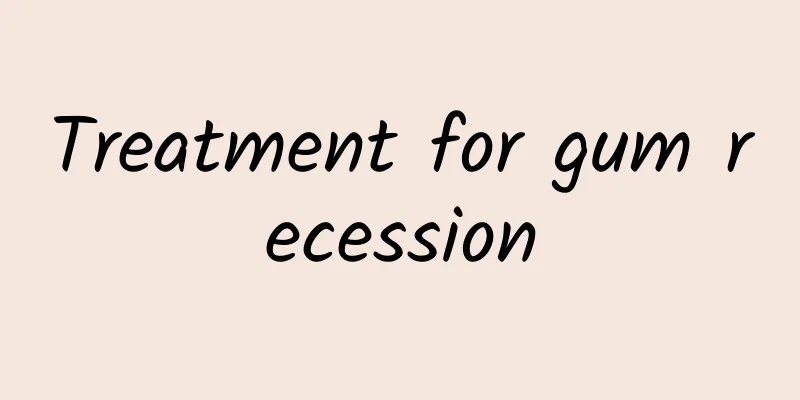Treatment for gum recession

|
Gum recession is a common dental disease. It is mainly divided into pathological and physiological. The so-called pathological refers to gum atrophy caused by some external factors. Physiologically, this refers to the phenomenon that people will experience to a greater or lesser extent when they reach a certain age. Pathological conditions require prompt treatment. Physiological sex is not necessary because it is a normal phenomenon. There are many reasons for pathological gingival recession. For example, not paying attention to oral hygiene can lead to bacterial growth and gum recession, or it can be caused by other dental diseases. However, some people who are obviously very young have physiological gum atrophy, which is also a pathological condition. So how to treat gum recession? Treatment for gum recession Small, uniform amounts of gum recession are generally asymptomatic and require no treatment. If gum recession continues to progress, the cause should be carefully identified and treated accordingly. Such as changing brushing habits, correcting bad restorations, adjusting bite or adding orthodontic force, etc. Treatment is mainly to prevent it from getting worse. For those whose gums of individual or a few front teeth are receding and affect their appearance, lateral transposition flap surgery, free gingival flap transplantation, connective tissue transplantation and other surgeries can be used to cover the exposed root surface. Patients with alveolar bone that is too thin or with bone cracks can also be treated with guided bone regeneration (GBR) surgery. Patients with secondary dentin hypersensitivity or root caries following gingival recession should be treated symptomatically. Gum recession is irreversible and the focus should be on prevention. 1. Develop good oral hygiene habits. You should choose toothpaste and toothbrush that comply with the recommendations of the National Dental Prevention Organization. Brush your teeth 2-3 times a day, and once before going to bed at night is essential. When you don't have time or it is inconvenient to brush your teeth, you can rinse your mouth instead. In some special occasions, you can rinse your mouth with soup or tea to keep your mouth clean. 2. Prevent and treat inflammatory oral diseases. Periodontitis, dental tartar, oral ulcers, gingivitis, gum abscesses, food impaction and ill-fitting dentures are all causes of gingival recession, so you should go to the hospital for regular check-ups and treatments, and seek advice on oral self-care knowledge; for gums that have already receded, surgical treatment can also be used. 3. Treat systemic diseases in the elderly that cause gingival atrophy. For example, endocrine disorders can lead to gum atrophy; anemia and vitamin C deficiency can cause bleeding gums; diabetics are prone to oral inflammation; serious diseases such as leukemia can also cause gum atrophy. After the primary disease is cured, gum recession will also improve. 4. Strictly prevent environmental pollution. Poisoning by arsenic, lead, etc. can lead to periodontitis, gingival edema and gingival atrophy, so you should pay attention to the quality of your work and living environment and avoid contact with toxic substances. Everyone must pay attention to their oral hygiene in daily life, brush their teeth every morning and evening, and the brushing time should not be too short. You should choose a toothbrush with softer bristles and develop good brushing habits. |
<<: Treatment of mild cervical erosion
Recommend
Man wakes up with pain every day
Many male patients with kidney deficiency and phy...
Gum root ulcer
The location of oral ulcers in each person's ...
What causes stomach distension?
The stomach is one of the most important digestiv...
Elderly people should keep these things in mind when keeping healthy in winter
The elderly must pay attention to health issues i...
Bright red bleeding during ovulation
We all know that the body structures of men and w...
What are the symptoms of insomnia and palpitations
Palpitations and insomnia is a disease name in tr...
Dry and itchy skin
Many people feel skin discomfort in the spring, w...
What causes kidney pain in women
In life, if you feel kidney pain, the first thing...
Can I drink soy milk, barley and red beans after abortion?
No matter what form of miscarriage occurs, it cau...
What medicine can I use to heal the wound quickly?
When a wound appears, the first thing to do is to...
Can minor varicose veins be cured?
If varicose veins are not particularly serious, y...
There are several possibilities for fainting due to stomach pain.
Stomachache can be said to be a common disease in...
What are the functions and effects of lymph?
Lymph is not unfamiliar to those who are familiar...
Symptoms of lumbar disc herniation in women
Women are also a high-risk group for lumbar disc ...
How to treat pharyngitis and cough?
The most common symptom of pharyngitis is coughin...









